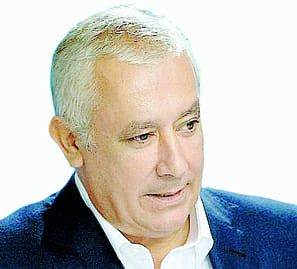CAN you imagine how busy the prime minister would be if he had to decide where to place every recycling bin, as well as whether to send troops to Afghanistan?
It makes sense that some decisions are made at a local and others at a national level and this is true for most European countries.
In Spain however, there is an extra level of decision-making, which came about largely due to a 35-year dictatorship.
After General Franco died in 1975, many of the regions wanted to separate from Spain.
It was touch and go whether Spain would remain intact and actually the country was only eventually held together because the 1978 Constitution was completely sensitive to the desires of the regions.
In short, they got a great deal of control over their own destiny.
This is why – much more so than in the UK, Germany or France say – the regional elections are so important.
And the party that takes control of the Andalucian Parliament tomorrow will have a strong influence over what happens in Andalucia for the next half decade.
The way the powers are divided between the centre and the regions are explained in articles 148 and 149 of the constitution.
However, the language used is often vague, leading to arguments about who exactly controls what.
The constitution even originally agreed that the autonomous communities would gradually be allowed to extend their powers – but does not say to what extent.
Rather like the law in Spain, it can lead to much conjecture, but either way, regional independence continues to be a very important part of democracy for most Spaniards, because rigid control by central government is still closely identified with Franco’s dictatorship.
This is reflected by public spending, with the regional governments getting 38 per cent, compared to just 18 per cent for central government.
Some 13 per cent goes to local councils and the rest is set aside for social security.
Even more telling is that of the so-called funcionarios (or civil servants), some 70 per cent of them work for the regional and local governments.
In a nutshell, central government controls international affairs, defence and justice, as well as commerce, finance and foreign trade, while the regions are in charge of town planning, public works and the environment, as well as tourism, welfare and culture.
Inside the Junta
Each autonomous community has a legislative assembly (also called parliament); a government council with a president and a supreme court which is responsible for the organisation of the courts within the autonomous community.
The Junta, or Andalucian Parliament, is located in Sevilla, Andalucia’s capital.
There are a total of 109 people elected to the parliament for four year terms. Each of the region’s eight provinces have eight seats; with the remaining 45 being distributed among the provinces in proportion to their population size (below).
So who’s going to win?
Due to increasing unpopularity with Zapatero’s Socialist government, in November the right-wing PP party got into power in a landslide victory.
If Andalucia votes the same way in the regional election as it did in the national elections, it would give the PP party a majority here for the first time in 30 years.
Incredibly, the PSOE has won every election since the creation of the Andalucian autonomous community.
According to opinion polls, the PP will indeed win. But nothing is guaranteed.
Because of the economic crisis, Prime Minister Rajoy has had to introduce an austerity package, which means cuts in government spending (by 8.9 billion euros) and he has announced plans to increase taxes – which goes against what he promised before the elections.
He might be getting quite a lot of protest votes.





